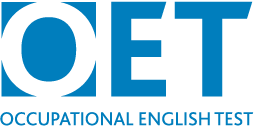The Japanese-Language Proficiency Test, or JLPT, is a standardized criterion-referenced test to evaluate and certify Japanese language proficiency for non-native speakers, covering language knowledge, reading ability, and listening ability. The test is held twice a year in Japan and selected countries, and once a year in other regions. The JLPT is conducted by the Japan Foundation for tests overseas, and Japan Educational Exchanges and Services for tests in Japan.

The International English Language Testing System is an international standardized test of English language proficiency for non-native English language speakers. It is jointly managed by the British Council, IDP and Cambridge English, and was established in 1989. IELTS is one of the major English-language tests in the world. The IELTS test has two modules: Academic and General Training. IELTS One Skill Retake was introduced in 2023, which allows a test taker to retake any one section of the test.

CELTA is an initial teacher training qualification for teaching English as a second or foreign language (ESL and EFL). It is provided by Cambridge Assessment English through authorised Cambridge English Teaching Qualification centres and can be taken either full-time or part-time. CELTA was developed to be suitable both for those interested in Teaching English as a Foreign Language (TEFL) and for Teaching English to the Speakers of Other Languages (TESOL). The full name of the course was originally the Certificate in English Language Teaching to Adults and is still referred to in this way by some course providers. However, in 2011 the qualification title was amended on the Ofqual register to the Cambridge English Level 5 Certificate In Teaching English to Speakers of Other Languages (CELTA) in order to reflect the wider range of students that teachers might have, including younger learners.
The Common European Framework of Reference for Languages: Learning, Teaching, Assessment, abbreviated in English as CEFR, CEF, or CEFRL, is a guideline used to describe achievements of learners of foreign languages across Europe and, increasingly, in other countries. The CEFR is also intended to make it easier for educational institutions and employers to evaluate the language qualifications of candidates for education admission or employment. Its main aim is to provide a method of learning, teaching, and assessing that applies to all languages in Europe.
Cambridge Assessment English or Cambridge English develops and produces Cambridge English Qualifications and the International English Language Testing System (IELTS). The organisation contributed to the development of the Common European Framework of Reference for Languages (CEFR), the standard used around the world to benchmark language skills, and its qualifications and tests are aligned with CEFR levels.

The Eiken Test in Practical English Proficiency, informally Eiken and often called STEP Eiken or the STEP Test, is an English proficiency test conducted by the Eiken Foundation of Japan, a public-interest incorporated foundation. The foundation is backed by the Ministry of Education, Culture, Sports, Science and Technology (MEXT).
B1 Preliminary, previously known as Cambridge English: Preliminary and the Preliminary English Test (PET), is an English language examination provided by Cambridge Assessment English.
Language proficiency is the ability of an individual to use language with a level of accuracy which transfers meaning in production and comprehension.

The Occupational English Test is an English language test that assesses the English language proficiency of overseas-trained healthcare professionals seeking to register and practise in an English-speaking environment.
C2 Proficiency, previously known as Cambridge English: Proficiency and the Certificate of Proficiency in English (CPE), is an English language examination provided by Cambridge Assessment English (previously known as Cambridge English Language Assessment and University of Cambridge ESOL examination).
C1 Advanced, previously known as Cambridge English: Advanced and the Certificate in Advanced English (CAE), is an English language examination provided by Cambridge Assessment English (previously known as Cambridge English Language Assessment and the University of Cambridge ESOL examination).
B2 First, previously known as Cambridge English: First and the First Certificate in English (FCE), is an English language examination provided by Cambridge Assessment English (previously known as Cambridge English Language Assessment and the University of Cambridge ESOL examinations).
Trinity College London, established in 1872, is a leading international exam board, publisher and independent education charity. Since 1938 Trinity has been offering English language assessments taken by over 850,000 candidates in over 60 countries each year.
Pearson PLC offers various international standardized test of English language proficiency for non-native English language speakers. The tests include the Pearson Test of English Academic, the PTE General, and PTE Young Learners. These are scenario-based exams, accredited by the QCA and Ofqual, and are administered in association with Edexcel.
A2 Key, previously known as Cambridge English: Key and the Key English Test (KET), is an English language examination provided by Cambridge Assessment English.
The EF Standard English Test is a standardized test of the English language designed for non-native English speakers. It is the product of EF Education First, a global language training company, and a team of language assessment experts including Lyle Bachman, Mari Pearlman, and Ric Luecht. EF compares the EFSET's accuracy to the most widely used high stakes standardized English tests: TOEFL, IELTS, and Cambridge International Examinations.
The Cambridge English Scale is a single range of scores used to report results for Cambridge English Language Assessment exams. It was introduced in January 2015, with Cambridge English Scale scores replacing the standardised score and candidate profile used for exams taken pre-2015. The scale aims to provide exam users with more detailed information about their exam performance than was previously available.
The Michigan English Test (MET) is a multilevel, modular English language examination, which measures English language proficiency in personal, public, occupational and educational contexts. It is developed by CaMLA, a not-for-profit collaboration between the University of Michigan and the University of Cambridge and has been in use since 2008.
Linguaskill is an online, multilevel test provided by Cambridge Assessment English. It is used by higher education institutions and employers in order to assess the English language skills of students and employees. The test is modular so institutions and employers can choose the combination of language skills they want to assess.




